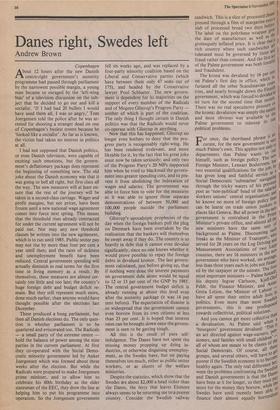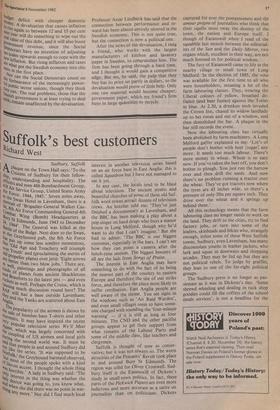Danes right, Swedes left
Andrew Brown
Copenhagen
About 12 hours after the new Danish centre-right government's austerity programme had passed through parliament' by the narrowest possible margin, a young man became so enraged by the 'left-wing bias' of a television discussion on the sub- ject that he decided to go out and kill a socialist. 'If I had had 20 bullets I would have used them all, I was so angry,' Tom Joergensen told the police after he was ar- rested for shooting a stranger dead on one of Copenhagen's busiest streets because he `looked like a socialist'. As far as is known, the victim had taken no interest in politics at all.
I had not supposed that Danish politics, or even Danish television, were capable of exciting such emotions, but the govern- ment's deflationary package does represent the beginning of something new. The old joke about the Danish economy was that it was going to hell all right, but first class all the way. The new measures will at least en- sure that the rest of the journey will be taken in a second-class carriage. Wages and profit margins, but not prices, have been frozen until a new national wage agreement comes into force next spring. This means that the threshold rises already contracted for under the current agreement will not be paid out. Nor may any new threshold clauses be written into the new agreement, which is to run until 1985. Public sector pay may not rise by more than four per cent a year until then; and the rates of sickness and unemployment benefit have been reduced. Central government spending will actually diminish in real terms for the first time in living memory as a result. By themselves, these measures are almost cer- tainly too little and too late; the country's huge foreign debt and budget deficit re- main. But they still represent much more, done much earlier, than anyone would have thought possible after the elections last December.
These produced a hung parliament, but then all Danish elections do. The only ques- tion is whether parliament is to be quartered and eviscerated too. The Radicals — a small party of the extreme centre hold the balance of power among the nine parties in the current parliament. At first they co-operated with the Social Demo- cratic minority government led by Anker Joergensen which was formed about three weeks after the election. But while the Radicals were prepared to make Joergensen prime minister, and to allow him to celebrate his 60th birthday as the elder statesman of the EEC, they drew the line at helping him to put his programme into operation. So the Joergensen government fell six weeks ago, and was replaced by a four-party minority coalition based on the Liberal and Conservative parties (which have between them only 47 seats out of 175), and headed by the Conservative lawyer Poul Schlueter. The new govern- ment is dependent for its majorities on the support of every member of the Radicals and of Mogens Glistrup's Progress Party neither of which is part of the coalition. The only thing I thought certain in Danish politics was that the Radicals would never co-operate with Glistrup in anything.
Now that this has happened, Glistrup no longer even bothers to deny that the pro- gress party is recognisably right-wing. He has been rendered irrelevant, and more likeable for it, by the fact that his great joke must now be taken seriously; and only two of the Progress Party's 20 MPs supported him when he tried to blackmail the govern- ment into greater spending cuts, and to pre- vent it from abolishing the indexation of wages and salaries. The government was able to force him to vote for the measures as it was able to ignore three separate demonstrations of between 50,000 and 100,000 people outside the parliament building.
Glistrup's apocalytpic prophecies of the day when the foreign bankers pull the plug on Denmark have been overtaken by the realisation that the bankers will themselves be swept away if they do. The country is so heavily in debt that it cannot even devalue significantly, since no one knows whether it would prove possible to repay the foreign debts in devalued kronor. The last govern- ment calculated, just before giving up, that if nothing were done the interest payments on government debt alone would be equal to 12 or 13 per cent of the GNP by 1985. The central government budget deficit is already running at about this level even after the austerity package (it was 14 per cent before). The expectation of disaster is so widespread that the government cannot even borrow from its own citizens at less than 23 per cent. It is hoped that interest rates can be brought down once the govern- ment is seen to be getting tough.
All this is the result of pure self- indulgence. The Danes have not spent the missing money propping up dying in- dustries, or otherwise disguising unemploy- ment, as the Swedes have, but on paying themselves too much, either as public sector workers, or as clients of the welfare ministries.
Despite the statistics, which show that the Swedes are about $2,000 a head richer than the Danes, the ferry that leaves Elsinore always seems to be returning me to a poorer country. Consider the Swedish railway
sandwich. This is a slice of processed cheese I pressed through a film of margarine onto a slab of processed bread two days before' The label on the polythene wrapper giv,es the date of manufacture as well as tu. grotesquely inflated price. It is clear that: rich country where such sandwiches arA tolerated must be governed by force ao fraud rather than consent. And the aet oa and dt h fer aPuadl mu l first centeengto. The krona was devalued by 16 per cevernment was both forceful on Palme's first day in office, which 111, furiated all the other Scandinavian col tries, and nearly brought down the Finnls.., government, which was forced to devalue its turn for the second time that Inc°biP „ There was no real speculative pressure on the krona; devalution was simply the easiese and most obvious way available to dial Palme government to sidestep its read political problems.
For once, the shorthand phrase is curate, for the new government s ve'
i: much Palme's own. This applies not onlY tun departments that Palme wants to1114 himself, such as foreign policy. The Itas Foreign Minister, Lennart Bodstroern, hh two essential qualifications for the joh: a has given long and faithful service as. Social Democratic 'submarine' naviga.tl: through the tricky waters of his Prev10.,i post as 'non-political' head of the salan'ei workers unions' central organisation; ali, he knows no more of foreign policy can be learnt on trade union junkets ; places like Geneva. But all power in the e government is centralised in the Pile Minister's private office, and almost all new ministers have the same sort °II background as Palme. Discounting slikco freaks as the Minister of Transport, g'"d served for 28 years on the Log Driving a110 Measurement Associations of two Lai„; counties, there are 16 ministers in the Ile, government who have worked, on averag; less than three years each in jobs not finall r ed by the taxpayer or the unions. The f°,11{ most important ministers — Palme his deputy Ingvar Carlsson, Kjeth,'-a. Feldt, the Finance Minister, and An Greta Leijon, the Minister of Labour .„ have all spent their entire adult lives .th" politics. Even more than most Swerhseei governments, this is one predisPos towards collectivist, political solutions. And you cannot get more collective thii; a devaluation. As Palme said whe11, is 'bourgeois' government devalued: `This an act directed against wage-earners, ir sioners, and familes with small children ,„ all of whom are meant to be clients of EP; Social Democrats. Of course, all Chest groups, and several others, will have to poorer if the Swedish economy is to becorv." healthy again. The only real difference he. lb ween the problems confronting the Swedlses and Danish governments is that the 10/ have been at it for longer, so they lutist P0ie more for the money they borrow, while 'to Swedes have until recently been able fis finance their almost equally horrend°- money, budget deficit with cheaper domestic neY. A devaluation that causes inflation to rise again to between 12 and 15 per cent teat Year Will do something to wipe out the ea( value of this debt, and it will also boost !everiunent revenue, since the Social taxmocrats have no intention of adjusting scales upwards enough to cope with the riaew inflation. But rising inflation and taxes nilLe what got the Swedish economy into this "s In the first place. lit 11°r can the Social Democrats count ,on forbearance of the increasingly power 117 public sector unions, though they think bell.call. The real problems, those that the
Isb government is at least trying to deal "ri, remain unaffected by the devaluation. Professor Assar Lindbeck has said that the connection between performance and re- ward has been almost entirely severed in the Swedish economy. This is not quite true, but the connection is now a political one.
After the news of the devaluation, I rang a friend, who works with the largest manufacturers of kitchen and lavatory paper in Sweden, to congratulate him. The firm has been going through a hard time, and I thought it would gain a competitive edge. But no, he said, the pulp that they buy has its price set partly in dollars, so the devaluation would prove of little help. Only one raw material would become cheaper; government paper, which my friend's firm buys in large quantities to recycle.















































 Previous page
Previous page